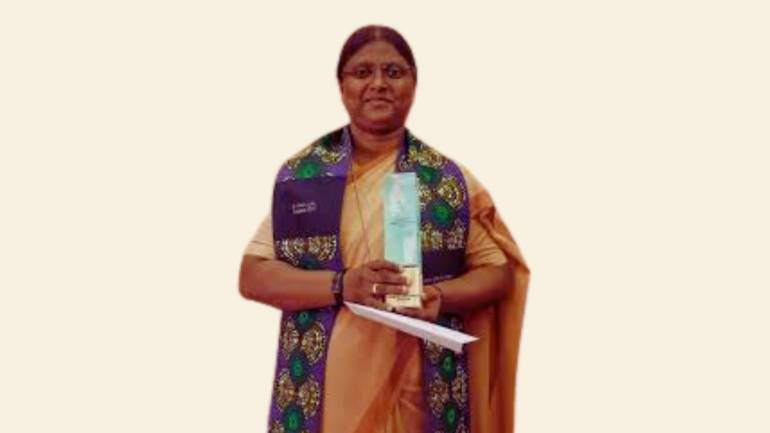Indian Canossian Nun honored with Sisters' Anti-Trafficking Award

As a social worker, Sr. Grasy has been involved in the rehabilitation of survivors and participated in rescue operations with organizations like the International Justice Mission and Justice and Care.
Sr. Grasy Luisa Rodrigues, FDCC, an Indian Canossian nun, was one of three Catholic nuns to receive this year's Sisters' Anti-Trafficking Awards (SATA) at the Augustinianum in Rome on May 23, 2024.
The awards, promoted by Arise, the International Union of Superiors General, and the Conrad N. Hilton Foundation, celebrate nuns who have demonstrated exceptional courage, creativity, and achievement in protecting their communities from human trafficking.
Sr. Grasy, a member of the Canossian Daughters of Charity, has dedicated the past 13 years to combating human trafficking in Maharashtra, Gujarat, and Goa. Based in Mumbai, she has worked tirelessly to defend vulnerable women, including transgender people and children living in slums, against exploitation.
The SATA aims to elevate the profile of Catholic Sisters' contributions in the fight against human trafficking, fostering collaboration and knowledge sharing across congregations and the anti-trafficking sector.
The three awards given are the Common Good Award for courage and creativity, the Servant Leadership Award for excellence in network-building, and the Human Dignity Award for lifetime achievement in addressing exploitation.
Each winner receives a trophy, a beautifully crafted scarf, and $20,000 to support their ongoing work.
Sr. Grasy, who is based in Mumbai, Maharashtra, western India, has dedicated her life to defending vulnerable women against exploitation, including transgender people and children living in slums.
She used to conduct awareness-raising seminars for them on safety, human rights, human dignity, protection from sexual exploitation, and other forms of societal problems.
Through a variety of motivational talks and skill-training initiatives, including courses in adult literacy, life skills, computer literacy, beautician, legal literacy, and tailoring, she has also attempted to empower women and children, so that they could live a dignified life, though they face many challenges for their livelihood, sanitation, and access to the welfare schemes of the government.
Grasy has assisted in teaching young people about the Indian Juvenile Justice Act, cyber safety and online exploitation, child labor, health and hygiene, and children's rights and protection.
As a social worker, Grasy has helped in the rehabilitation of survivors and attended rescues as part of her work with larger networks, such as the International Justice Mission and Justice and Care, among others.
In 2022, she became a founding member of the newly formed NGO "Mukti Kiran" (Ray of Liberation). The organization works with the Goa Police to prevent human trafficking.
She conducts human trafficking awareness campaigns in nearby hotels, colleges, villages, schools, and slums with the support of law enforcement agencies.
In addition, she plans door-to-door campaigns, street performances, quizzes, and rallies to prevent human trafficking, seeking others’ cooperation and support.
One of her workplaces is in Goa, western India. Goa is a tourist destination known for its beaches and holiday attractions. It has a lovely nature, and people from different cultures live and visit there. That leads to other forms of crime, such as prostitution, human trafficking, and drug use.
Kidnapping and forced child labor occur frequently among women and children, says Grasy.
In Goa, Conaoisan nuns dedicate their lives to empowering children and women.
“Education plays an important role in empowering them to stay safe from illicit trafficking and exploitation,” she added.
Migrant people from various parts of India also live here in search of a better life and employment, and it is not straightforward for them as they lack social security, resources to have affordable housing, sanitation, and a stable source of income with their skilled or unskilled labor, Grasy explains.
They live in slums, where the conditions and amenities are terrible. They are poor. There is a shortage of clean water for domestic use and consumption.
"We work with them in order to empower them. We train them with various skills to earn their livelihood,” the nun said.
After attending several rounds of workshops provided by the nun’s NGO, women have the confidence to take their lives forward with courage and grit.
“I have been in Goa for the last five years. I have seen drug abuse, murders, and rape,” she said.
As Goa becomes the destination state for human trafficking, the situation becomes worse day by day.
“But there is hope. We see a light that gives hope to humanity,” she added.
“With a network of police, other NGOs, faith-based organizations, and ordinary people, we rescue and prevent human trafficking. Whatever cases we have, we have tried to bring justice to human trafficking victims and hope,” she said.
She cannot do it alone. She is merely a small part of the larger picture. She needs others' collaboration and support.
“I need my nuns, others, and God to bring hope to the world, especially the poor women and children, so that they may experience love and mercy in their lives,” she said.
“In the convent, we share our joys and struggles in the ministry that we do, support each other, and learn from each other,” she said.
Collaboration with other priests and nuns from different congregations, civil society groups, government agencies, and the public is crucial in fighting against human trafficking and exploitation, Sr. Grasy said.
Her efforts continue to give victims of trafficking justice and hope, illuminating their lives.








